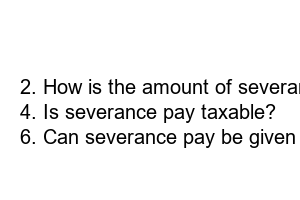퇴직금 조회
Title: Severance Pay Inquiry: Understanding the Key Factors and Legal Requirements
Introduction:
Severance pay is a topic that often arises when employees leave their jobs. It is a financial package offered by employers to compensate employees who have been terminated or laid off. In this blog post, we will delve into the various aspects of severance pay, including its importance, legal requirements, and frequently asked questions.
1. What is Severance Pay?
Severance pay refers to the compensation provided to an employee upon termination of their employment. This financial package is typically a lump sum or salary continuation and is intended to support the employee during the transition period until they secure a new job.
2. Factors Influencing Severance Pay:
Several factors affect the amount of severance pay an employee may receive. These factors include the length of their employment, their position within the company, their salary, and any relevant employment terms outlined in their contract. In most cases, severance pay is negotiable between the employer and employee.
3. Legal Requirements for Severance Pay:
Legal requirements for severance pay vary by country and jurisdiction. While many countries do not mandate severance pay, there are specific regulations in place to ensure fair treatment of employees. It is essential to understand the applicable labor laws and employment contracts within your region to determine whether you are entitled to severance pay.
4. Severance Pay vs. Statutory Entitlements:
Severance pay is often confused with statutory entitlements. While statutory entitlements include benefits such as unpaid wages, accrued vacation time, and unused sick leave, severance pay is an additional compensation package provided by the employer. It is important to differentiate between these two to ensure you receive all the benefits you are entitled to.
5. Negotiating Severance Packages:
When facing a termination or layoff situation, it is crucial to understand the value of your skills and contributions to the company to negotiate a fair severance package. Seek legal advice if necessary to ensure you receive a favorable agreement that respects your rights and compensates you adequately for your service.
6. Can Severance Pay be Denied?
Employers have the right to deny severance pay under certain circumstances, such as when an employee is terminated for gross misconduct. However, it is essential to consult labor laws or employment contracts to determine the reasons under which severance pay can be legally withheld.
7. Severance Pay: A Safety Net for Employees:
Severance pay is designed to provide financial support to employees who experience job loss. It helps bridge the gap between employment and encourages a smoother transition into new opportunities. Understanding your rights and obligations regarding severance pay can significantly impact your financial stability during this period.
Summary:
Severance pay plays a vital role in supporting employees during job loss. While it is not mandatory in many jurisdictions, understanding the legal requirements and negotiating an appropriate severance package can ensure fair treatment and a more secure future. By familiarizing yourself with the factors influencing severance pay, you can navigate termination or layoff situations with greater confidence and peace of mind.
Frequently Asked Questions:
1. Is severance pay mandatory in all countries?
2. How is the amount of severance pay determined?
3. Can severance pay be negotiated?
4. Is severance pay taxable?
5. Are all employees entitled to severance pay?
6. Can severance pay be given in installments?

